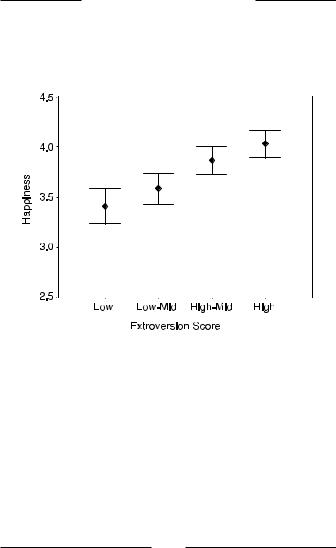
Books on Happiness / Happiness_ The Science Behind Your Smile
.pdf
WORRIERS AND ENTHUSIASTS
avoided, it is better to see neuroticism as a mixed blessing, with certain signature strengths, rather than a handicap.
The prediction for the relationship between extroversion and happiness is a little less straightforward. As we have seen, extroverts want rewarding things more strongly than introverts do. However, it doesn’t follow that they should be any happier. It could even be the other way around. With so many things that they crave, they might be dissatisfied much of the time. Moreover, wanting things strongly is not the same as liking them once you have them, as we shall see in a later chapter.
In fact, extroverts do tend to be happier. The relationship between extroversion and happiness score in our online study is shown in Fig. 4.2. Other studies have also shown this pattern, and demonstrated the mirrorimage pattern to neuroticism. That is to say, extroverts have more positive emotion, but can have just as much negative emotion as anyone else. If it is any consolation, the cheery socialite can have moments of existential dread and pain just like anyone else.
I think the most likely explanation for the greater happiness of extroverts is that they are more likely to do things with a strong emotional reward. At any given point in time, your extrovert is more likely to be married, more likely to have been to a party, more likely to
102

WORRIERS AND ENTHUSIASTS
Fig. 4.2 Average happiness rating of British adults on a 5 point scale by extroversion score. The four groups are formed by creating quartiles from the set of scores. N = 567.
103

WORRIERS AND ENTHUSIASTS
have been playing sports, more likely to have talked to friends, and has had sex more recently, than your introvert. His personality leads him to draw a series of moments of reward from the environment. Thus when you ask him, he is differentially likely to be in a positive affective state. People who rate their happiness as unusually high are low-neuroticism extroverts who spend little time alone. Thus, at the moment of asking, they are more likely to have just come from some social interaction or other.
Once again, it might seem that greater extroversion is an unalloyed benefit, since extroverts report themselves to be happier. However, in recent studies we have found that the restlessness of extroverts makes their family lives unstable in the long term. Moreover, they have an increased risk of serious accidents and hospitalizations. Nothing in life is without a downside, and thus the slightly greater happiness of extroverts is not necessarily to be envied, but merely seen as a trade-off.
There are other personality dimensions that correlate with happiness. Individuals who score highly on scales of agreeableness and conscientiousness also tend to be happier. The determination of happiness by personality, then, seems to happen in two ways. First, there are direct influences. Some personality traits control the tuning of emotion systems; that is, how easily
104

WORRIERS AND ENTHUSIASTS
emotion systems go off. This obviously has a direct effect on happiness. Then there are indirect effects; personality traits which determine the way we schedule and rank the possible behaviours in our environment. In the case of extroversion, high scorers spend more time in social interaction and other pleasurable activities. In the case of conscientiousness and agreeableness, high scorers may get things done, yielding a feeling of satisfaction, or be nice to others, yielding reciprocal and felicific favours in turn. The distinction between direct and indirect effects is important for the question of which aspects of happiness can be deliberately manipulated, and how.
The discovery of these stable temperamental determinants of happiness has been an extremely important one (though, let us face it, it is something we all suspected). It seemed to make sense of the findings that the associations between happiness and things like wealth and marital situation are rather weak. Indeed, it even suggests that such associations as there are between life circumstances and happiness may not be what they seem. For example, in our online data, married people are happier than single people, as we would expect. However, they are also less neurotic, and this is likely to be a cause rather than a consequence of their marital
105

WORRIERS AND ENTHUSIASTS
status. We know that neurotic people’s relationships are disproportionately likely to break up, so many of them probably won’t make it into matrimony.
When you control statistically for the differences in neuroticism, the happiness gap between the single and the married is only about half what it is in the uncorrected data. Thus the causal effect of marriage may not be as strong as we would have supposed (and even this is probably subject to adaptation in the long term, as we saw in the last chapter). What seems like an effect of life circumstances on happiness is really, at least in part, an effect of personality on life circumstances.
This could be quite a general phenomenon. In a famous study, Bruce Headey and Alexander Wearing of the University of Melbourne set out to examine the relative contributions of personality and life events to happiness by repeatedly interviewing a panel of several residents of Victoria over a number of years. The direction of their investigation was soon coloured by their observation that the same kinds of events kept happening to the same people. Thus, in the end, rather than treating life events and personality as two independent sources of influence on happiness, they looked at how personality influences life events.
It turns out that high neuroticism scorers simply have more bad things happen to them. Their financial affairs
106

WORRIERS AND ENTHUSIASTS
and their social relationships are unsettlingly likely to go belly-up. Extroverts, on the other hand, are more likely to experience changes for the better in many life domains. Individuals high in another dimension, called Openness to Experience, just had more things happen to them, both good and bad. This dimension is not correlated with happiness, possibly because the good things and the bad things cancel each other out.
We know that in this study, causality cannot run from life events to personality scores, since the study assessed personality in the first interview, and life events in subsequent years (and personality scores are very stable over time anyway). There are potential methodological confounds, though. High neuroticism scorers tend to exaggerate negative events, and are also differentially likely to remember the negative aspects of things. Thus, faced with assessing whether a life event like ‘serious argument with children’ or ‘continuous financial worry’ has happened to them over the last two years, they could be likely to conclude that it had even though their objective situation is no worse than anyone else’s. However, there are some events—like getting married, getting divorced, or getting sacked—that leave little room for ambiguity or selective memory. They either happened this year or they did not. In the Headey and Wearing study, and in others, the occurrence of these
107

WORRIERS AND ENTHUSIASTS
objective events is related to neuroticism and extroversion and rather consistent over time. Some people just keep having catastrophes, and others always land buttered-side up.
How can this be the case, given that events like these seem to come from sources external to the person? Neuroticism is a predictor of vulnerability to depression, as well as many forms of physical ill health, so the life events involving health will obviously be related to it. Health has knock-on consequences in the career domain (unfortunately, it is hard to get promoted if you miss a lot of work due to illness), and probably in family life too. Depression, in particular, can be very damaging in social and marital relationships, and it leads to poor decisions of all kinds. High neuroticism scorers will often end up reaping the consequences of decisions made when depressed.
For extroversion, it is harder to see the link. Extroverts will tend to take more risks, but one would imagine that would increase negative outcomes as well as positive ones. Their enthusiasm and positive energy may often prove self-fulfilling prophecies, and their greater sociability could certainly mean that they attract networks of people keen to contribute to the enterprise, who may then be there to catch them if they fall.
108

WORRIERS AND ENTHUSIASTS
The Australian study shows that part of the association between happiness and life events is really an indirect association between personality and happiness. This means that when we examine the relationship between life circumstances and happiness, as we did in the previous chapter, we almost certainly overestimate how important life events are. Having said that, Headey and Wearing concluded that life events did have a genuine effect on well-being over and above the indirect operation of personality, although for each event this effect would be subject to adaptation over time.
Let us summarize the main factors associated with differences in happiness reviewed in this chapter and the last. The best way of doing this is to consider the amount of variation accounted for by each factor. This is the method statisticians use for thinking about the relative strengths of a whole list of influences on some outcome. For example, if we had to predict as accurately as possible how happy someone was, and knew absolutely nothing about him or her, then we would just guess. If we had any sense, we would do this by choosing the average score for the population. Comparing our prediction to the true score, we would make a certain amount of error. Now suppose somebody gives us one piece of information about the person in question. If that type of information accounts for 100% of the
109

WORRIERS AND ENTHUSIASTS
variation in happiness in the population we are studying, then we can now predict with absolute accuracy the target person’s happiness. Our error would be zero. If on the other hand, the type of information we have been given only accounts for only 1% of the variation in happiness, then we would be only slightly better off than if we were guessing—our error would be, on average, 99% as large as it was when guessing. And if the information accounted for 50% of the variation, then our error would be half its previous size, and so on. We can thus tabulate, for various types of information, how much variation in happiness is accounted for when this information is introduced (Table 4.1).
Even this very simple analysis, which makes no attempt to tease apart the relationships the different factors have with each other, makes it quite clear that factors internal to the person have a larger effect than those that are features of his or her objective situation. If you want to know how happy Bob will be in ten years’ time, don’t bother to think about the fact that he will then be in his forties, or that he is a man. Don’t consider the fact that he is a dentist who will by then be in the top 5% of wage earners and have a huge house in the country. Don’t even factor into your deliberations the beautiful and voluptuous wife he will meet or the three children she will bear him. Instead, have him
110

WORRIERS AND ENTHUSIASTS
Table 4.1 Estimates of the proportion of the inter-individual variation in happiness accounted for by various factors considered one at a time. Note that indirect pathways (for example from neuroticism via marital status to happiness) have not been modelled and thus the importance of some situational factors is if anything overestimated.
Factor |
Variation accounted for |
|
|
Sex |
1% |
Age |
1% |
Income |
3% |
Social class |
4% |
Marital status |
6% |
Neuroticism |
6–28% |
Extroversion |
2–16% |
Other personality factors |
8–14% |
|
|
take a personality inventory. Alternatively, for the best estimate of all, simply ask him how happy he is right now.
This is rather a sobering conclusion, and it leads some people to a gloomy prognosis. If your set point of happiness is determined by your temperament, it seems to imply that it doesn’t much matter what you try to do. Your level of happiness will remain stubbornly unmoved for more than a few feeble days. As Lykken
111
